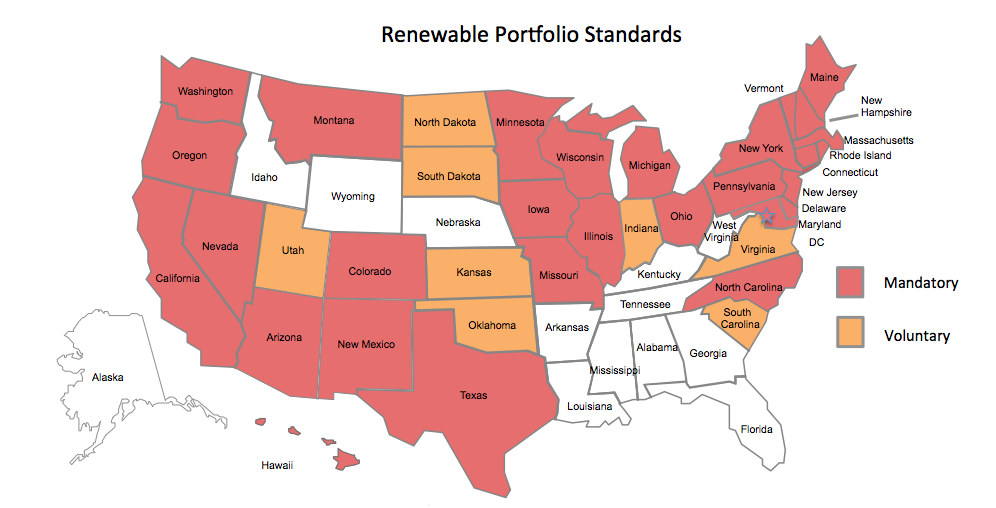
In a recent opinion piece in the Wall Street Journal (“States Are Unplugging Their Renewable-Energy Mandates”), two state directors of the Koch brothers-backed Americans for Prosperity trotted out several tired and misinformed arguments against Renewable Portfolio Standards (RPS). The problem with this piece and others like it isn’t only that they mislead the reader with inaccurate statements and outdated information. The real problem is that they sidestep the central rationale for an RPS – overcoming the market and regulatory barriers that distort energy choices in this country.
U.S. energy markets are heavily regulated, and skewed in favor of incumbent resources, namely fossil fuels. As a result, the economic value of renewable energy’s significant consumer benefits – which include national security, diversity of supply, protection against price fluctuations, water conservation, and reduction in economy-damaging air and water pollution – isn’t captured.
An RPS creates a market where renewable energy resources have a chance to grow, compete, and lower costs for consumers and businesses. Wind and solar prices have declined by more than half over the last five years. In some states, wind power is being sold for 2 cents per kWh, and a recent solar contract signed by NV Energy was described by a Bloomberg analyst as the cheapest power purchase agreement (PPA) seen in the U.S.
The claim that an RPS causes electricity prices to soar has also been debunked by DBL Investors, which found that the states with the most renewable energy actually had lower electric rates than the national average.
The authors of the op-ed attempt to support their case by citing stale pricing data. A recent report from Advanced Energy Economy Institute underscores the fact that government pricing information on renewables is outdated, and in some regions, these technologies are at cost parity with coal and gas. The National Renewable Energy Laboratory estimated that the incremental cost of RPS is less than 4% of electricity rates in every state studied.
These minimal costs are more than offset by the billions of dollars of private investment that renewable requirements drive, bringing jobs and economic development to rural communities. Iowa’s RPS, the first in the country, has brought $10 billion of investment and more than 6,000 full-time jobs to the state.
That’s why Iowa farmers and ranchers view wind as a major drought-resistant cash crop, and why polls consistently show that a majority of Americans strongly supports renewable energy standards.
Oh, and regarding the authors’ assertion that states are rolling back their RPS – the fact is, none of the 29 states with a true RPS has repealed it. Ohio has frozen its standard while a legislative committee considers adjustments; Kansas made its RPS voluntary, but only after its goal had already been met, rendering the policy shift inconsequential. West Virginia did revoke its loosely-called “renewables” standard, but that was one that could have been met entirely with coal and natural gas.
Many states like Texas have rejected attempts to scale back their RPS, and five are currently considering increasing their requirements. That’s because they understand that these programs drive investment and help keep electricity costs down. Why unplug a connection that’s working?
Questions have been raised, by the Wall Street Journal and others, about whether renewable energy and energy efficiency resources can provide substantial emission reductions at reasonable cost under EPA’s proposed Clean Power Plan. These concerns reflect fundamental misperceptions about the performance and cost of today’s renewable energy and energy efficiency technologies, rooted in outdated information and perpetuated by inaccurate official market projections. Get the full story by downloading the latest report from AEEI: Competitiveness of Renewable Energy and Energy Efficiency in U.S. Markets.
